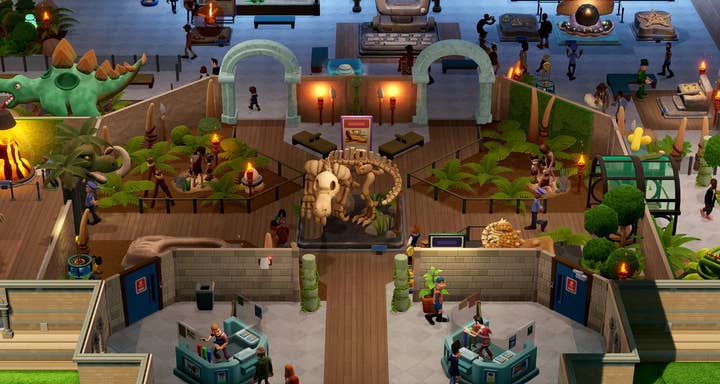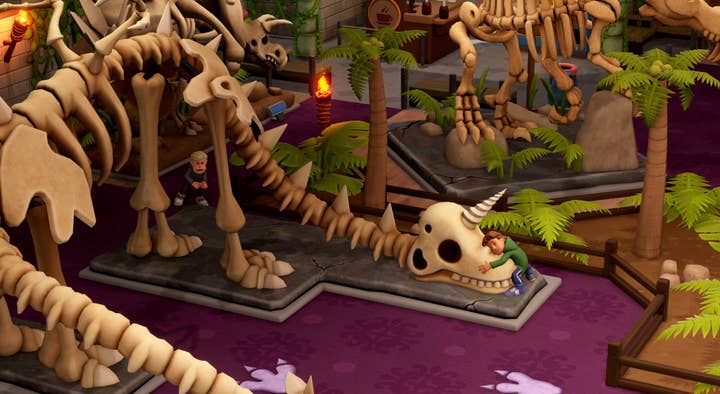
Why Two Point Studios returned to the office

It doesn’t feel that long since we last spoke to the team at Two Point Studios.
In fact, it was two years ago, on the eve of the release of its second game: Two Point Campus. The simulation title had just suffered a slight delay, and one of the reasons the studio cited for the date shift was because the game had been made almost entirely during lockdown.
At the time, founders Mark Webley and Gary Carr said that it wasn’t until the end of development that they noticed a few issues. The sort of issues, they suggested, that would have been picked up if the team had been operating in the same space. This is a studio that’s used to looking over each other’s shoulders, spotting issues with how their colleagues are playing the game, or taking a brief moment to highlight a tiny bug. For the vast majority of Two Point Campus’ development, that simply didn’t happen.
Two years on, and Two Point Studios appears similar to the one we spoke to back then. The same leaders, the same team size (around 40 people) and they’re still making management sim titles set in the fictional Two Point County. The company’s next game, due in February next year, is called Two Point Museum.
Yet whereas Campus was made almost entirely remotely, Museum has been made almost entirely in-office.
“It was a much easier development process this time,” explains executive producer Jo Koehler.
“Last time we spoke, we talked about Covid and the effect that had on the production of Two Point Campus. We went into full production about the week of the lockdowns. We thought it would be a month at home then we’d back, but that wasn’t to be. With Museum, we are back in the office four days a week for most people. And having that back and forth, face-to-face has been really fantastic.”
Design director Ben Huskins adds: “Those little ad-hoc chats… when we are at home, someone would message you on Slack and you might not spot that for an hour, and they only wanted a two minute chat. That sort of thing is so much easier in the office.”
Koehler again: “We all say the magic happens when you’re all in the same place. Having all those playthroughs in the office… it’s been really good.”

The ability to operate in-person has also been crucial in Two Point Studios’ efforts to make its games approachable.
Each of the Two Point games are standalone. 2018’s Two Point Hospital, 2022’s Two Point Campus and 2025’s Two Point Museum feature some cross-over elements and characters (I am told there’s a fan community built around in-game radio DJ Sir Nigel Bickleworth), but they are distinctly their own experiences. Two Point Campus, for example, focused on building a relationship with the students in the game, whereas the upcoming Two Point Museum is less about the characters and more about going on adventures to find exhibits to display.
And each game has its own fans. There are those that move from game-to-game, but Huskins and Koehler tell us that there are plenty who come in for the specific experience of running a hospital, or setting up a school. That means, the team has to approach each game as if its audience has never played one before.
And just generally, Two Point Studios is proud of the fact that its games appear welcoming. Its simplistic but characterful visual design, the chunky UI… it’s all part of the company’s focus on making sure its games are not off-putting to more casual users.
“We spend a lot of time thinking about the onboarding process for the game, and ease people in,” Huskins tells us.
“And that’s not just about [existing] Two Point players vs new players, but that’s also us trying to deal with hardcore management players and those who want a more relaxing experience and might feel overwhelmed loading up a management sim. That is a real pillar of our studio, which is having that depth to the game, but trying to make it as accessible and approachable as possible. We spend a lot of time thinking about how we gradually introduce these features. We have it so the game still works with the base set of features, but then we layer things on.”
And the key to that is testing, watching, tweaking – all of which are easier to do when you can see people playing the game, whether that’s in an office or even at events.
“We do a lot of iteration on things like that,” Koehler explains. “We do a lot of playtesting as things go along. And events like Gamescom, it’s great to look over people’s shoulders and see how they play.”
“With Two Point Museum, we are back in the office four days a week for most people”
Jo Koehler, Two Point Studios
Two Point Museum continues the studio’s penchant for creating management sims that are based on everyday concepts, but with an added layer of humour and fantasy on top. In the case of Museum, you might discover a caveman in a block of ice and put it on display, but if you’re not careful, the ice could melt and the caveman would escape.
“It’s the idea that it’s grounded in reality to an extent, but it allows us to put our own twist on it, and our own style of humour on it as well,” Huskins explains.
I’ve always thoroughly enjoyed the Two Point games, and my playthrough with Museum left me with little doubt that the series’ signature style, humour and quality remain intact. Where I was a little disappointed was to see the absence of a Nintendo Switch version (which is how I played the first two games). The Switch version of Campus was a priority for Two Point Studios due to how successful Hospital had been on the platform. So why skip it this time around?
“With each game, we’ve pushed the tech each time,” Huskins tells us. “And there’s a few things that we’re doing this time like the lightning effects [for the exhibits]. And we’ve also got quite a lot of depth to each museum, which gives you reasons to come back to them. Whereas previously, you would get three stars [on your creation] and you felt like you’d move on. Whereas, with this game you can play the museum for much longer, so you can end up with lots of things going on and lots of characters.”
Huskins did suggest more platforms could come up down the line – a hint, perhaps, that a Switch 2 version would be on the cards.

For now, the team has its hands full, not just with Museum, but it has vibrant communities still playing Hospital and Campus, too.
“[Expanding the universe] definitely affects our focus in terms of where we do updates,” admits Huskins. “We don’t have as many people focused on a particular game.”
Koehler cuts in: “We have to think quite carefully about making sure we’re doing the right things. So doing the things the player wants. So when we do the post-release roadmaps, we listen very closely to the community.”
Huskin concludes: “We have a list for every game of the quality of life updates we’d like to do, here is some feedback from the community, any bugs we’ve not been able to fix… and then it’s just a case of prioritising it in terms of what gets the focus.
“For now, we’re managing it, and certainly being back in the office has helped us with that.”







